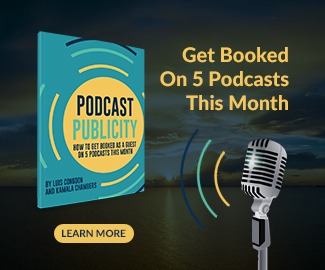Persuasive Speaking – Dr. Jack Schafer
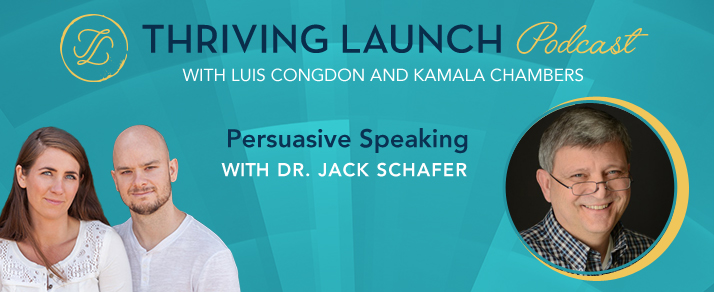
Former FBI agent and author, Dr. Jack Schafer, shares some techniques we can use to develop business relationships or friendships.
Get others to like you and help you succeed by using non-verbal cues and persuasive speaking techniques.
![]() Three basic nonverbal “like” signals we send off:
Three basic nonverbal “like” signals we send off:
- Eyebrow flash
- When two people approach one another, they eyebrow flash each other if they are not a threat to one another.
- Head tilt
- By tilting our head, we’re exposing our carotid artery and lets people know we don’t pose a threat.
- Smile
- It lets people know you don’t have any evil intent towards them.
![]() With our non-verbal cues, we can send signals we don’t even realize we’re sending.
With our non-verbal cues, we can send signals we don’t even realize we’re sending.
![]() Make an empathetic statement to get another person to become more receptive to you. Then flatter or compliment them to continue the sense of connection.
Make an empathetic statement to get another person to become more receptive to you. Then flatter or compliment them to continue the sense of connection.
![]() Allow people to compliment themselves. Provide an opportunity where they can give themselves a psychological pat on the back.
Allow people to compliment themselves. Provide an opportunity where they can give themselves a psychological pat on the back.
![]() The golden rule of friendship says that if you want people to like you, you make them feel good about themselves.
The golden rule of friendship says that if you want people to like you, you make them feel good about themselves.
![]() If you’re talking to someone asking for his/her help, imagine you’re talking to a friend and focus less on the problem.
If you’re talking to someone asking for his/her help, imagine you’re talking to a friend and focus less on the problem.
![]() All relationships are based on these four elements:
All relationships are based on these four elements:
- Proximity
- Frequency
- Duration
- Intensity
![]() If you focus on other people, they’ll like you because you make them feel good about themselves, and they will be drawn to you instinctively.
If you focus on other people, they’ll like you because you make them feel good about themselves, and they will be drawn to you instinctively.
![]() If people like you, they’re going to help you do things and want you to succeed in life.
If people like you, they’re going to help you do things and want you to succeed in life.

Kamala Chambers
On this episode, we’re going to be talking about persuasive speaking and how our facial cues, how our body mechanics either attract people or repel them away from us and how a simple shift in our body mechanics can create influence.
Today, we’re here with Dr. Jack Schafer. He’s a retired FBI special agent, a persuasive speaking expert, and he’s currently working as a professor at Western Illinois University. He’s the author of The Like Switch: An Ex-FBI Agent’s Guide To Influencing, Attracting and Winning People Over. You may notice that we call him John on the episode, but he goes by Jack.
Jack, it’s fantastic to you on here on Thriving Launch talking about persuasive speaking. I’m excited about this interview, and one of the reasons I’m happy is because you are an ex-FBI agent, and you can use those skills, and you could teach us how to use those skills that you learned in the FBI to influence and persuasive speaking and to win people over. This is just something cool to me.
Are you ready to launch into persuasive speaking?

Dr. Jack Schafer
Yes, I am.

Kamala Chambers
All right.
The first question I have for you is I just want to hear a little bit about your background in the FBI that cause you to write you book The Like Switch and develop this body of work around persuasive speaking.

Dr. Jack Schafer
I began my FBI career working criminal investigations on the Indian reservation. Out there, I had to talk to a lot of suspects to get them to confess to various crimes. Then from there, I went to language school. I learned Korean, and then I was assigned to a counterintelligence unit.
What You Need To Know About Persuasive Speaking

Dr. Jack Schafer
A Counterintelligence Officer catches spies. That’s where I spent most of my career. The last seven years of my career, I spent as Behavioral Analyst with the FBI. It’s different than the BAU, the Behavioral Analysis Unit you see on TV.
They have a crime scene, and they typically try to figure out who did the crime based on the artifacts left at the crime scene. In the Behavioral Analysis Unit, we typically had a suspect or subject. We ask them to do the certain thing or make a confession or interview them or get them to turn on their country and spy for us, and we would examine their personality and look for vulnerabilities and then develop strategies to play to those vulnerabilities.

Luis Congdon
What are some of the first things we need to understand in regards to attracting and connecting, and having the charisma that makes people like us?

Dr. Jack Schafer
I think the first thing that people have to realize is that we send nonverbal signals and persuasive speaking over long distances.
There are three persuasive speaking signals that we send off. We don’t realize we send those signals off, but they’re non-verbal communications and persuasive speaking.
For example, eyebrow flash. The eyebrow flash is the quick up and down movement of the eyebrows, and it lasts about 1/64 of a second. It’s a long range friend signal for persuasive speaking.
So when two people approach one another, they eyebrow flash each other if they are not a threat to one another. If we eyebrow flash somebody, and we don’t get an eyebrow flash in return, then our brain picks up on that subconsciously and lets us know that something’s a little off or something’s odd with that person and then may post a threat.
Non-Verbal Persuasion And Persuasive Speaking

Dr. Jack Schafer
What happens is we approach people. One of us will eyebrow flash, and then the other person will return the eyebrow flash, and that’s just communicating back and forth, telling each other we’re not a threat.
The second thing that we look for is the head tilt. When we tilt our head slightly to the left or the right, we’re exposing our carotid artery. That’s an important artery that gives oxygenated blood the brain, and it’s vital.
By tilting our head, we’re exposing that vital artery and lets people know we don’t pose a threat because if we’re threatened, we try to protect that artery. So, we do head tilt and let’s other people know it’s a friend persuasive speaking signal.
The last one is the smile. A smile is interesting because it lets us know that we’re friends. It lets us know that we don’t have any evil intent towards one another.
The other thing a smile does and a lot of people don’t realize this is when we smile, our brain releases endorphins. Those are the chemicals in the brain that make us feel good about ourselves.
The combination of these three things; eyebrow flashing, head tilting, and smiling, lets other people know we are not a threat, and we are open to communication with them.

Kamala Chambers
Oh, my God. I love what you’re talking about.
Are there other persuasive speaking non-verbal cues like hand gestures or the way you hold your posture? I’m sure that there is a wealth of things but anything that you want to share with us?

Dr. Jack Schafer
An interesting story is that I grew up on the southside of Chicago, which is a dangerous neighborhood. When you’re in a dangerous area, you don’t want to send off persuasive speaking friend signals because there are a lot of predators in those areas that want to take advantage of you.
Intimidation And Influence With Non Verbal Persuasive Speaking

Dr. Jack Schafer
As I grew up in the cities where I would call the urban scowl, I would neither eyebrow flash, smile, nor head tilt. I would let people know that I’m not going to be a very soft target.
What’s interesting is when I went out with my wife, and she lived in the suburbs. When I went out to the suburbs, her friends kept saying to her, “Why do you like him? He seems like he’s angry all the time and he’ll bite my head off if I talk to him.” She kept saying, “No. He’s a good man.”
I realized I was taking that urban scowl out into the suburbs where they’re not used to that. They’re used to seeing persuasive speaking friend signals, so they automatically interpreted that as me being mean and not liking people.
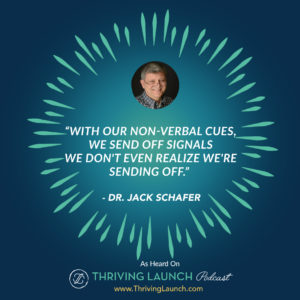

Dr. Jack Schafer
The three persuasive speaking signals that we mentioned before, people come back to me after reading the book or listening to my lecture saying, “We don’t even realize that we eyebrow flash and it’s amazing.” Once you know about the eyebrow flash, then you can spot it everywhere you go. Hundreds of times a day, you’re eyebrow flashing people, and people are eyebrow flashing you in return.

Luis Congdon
You brought a whole new meaning to flashing.

Dr. Jack Schafer
Yeah. I guess it is an entirely new meaning of flashing.

Kamala Chambers
It’s a much more positive one.
Non Verbally Intimidating People And Persuasive Speaking

Kamala Chambers
I agree with this. This has been analyzed, but I’ve found it’s been very helpful for me to change my body posture depending where I am in the world. As a female, I’ve been in a lot of situations, and as a world traveler, I’ve been in situations where I’ve been in potential danger.

Luis Congdon
Maybe it wouldn’t be good to flash people.

Kamala Chambers
No. It wouldn’t have been good to eyebrow flash anyone for persuasive speaking.
I remember being in Guatemala and my friend took off on me. I was out on the streets. There’s nobody else around and I alone in a very dangerous area.
I spread my legs far apart. I jetted out my bottom jaw. I put my hair all like over my face, and I swung my arms violently so I could look as ugly as I possibly could and as intimidating. I tried to look crazy too so people wouldn’t mess with me. Nobody messed with me instead of the average guys driving by honking and whistling.
I think there are so many different ways we could apply what you’re talking about with persuasive speaking.
I’d love to hear a little more about how you use what you learned to win people over.

Dr. Jack Schafer
When I go into social situations or even more importantly when I want to exchange something at a store when something is broken, it doesn’t fit right. It’s a hassle when you have to go to the exchange counter, and they’re not always as friendly as I think they should be.
Non Verbally Winning People Over And Persuasive Speaking

Dr. Jack Schafer
What you want to do is as soon as you walk up to that counter, do the eyebrow flash, head tilt and smile. That lets that person know, “Wow. This person is not going to be a threat.” If you make an emphatic state that increases the likelihood, they’re going to like you, and an emphatic statement is very simple.
What you want to do is look at that person, see what their physical status is, think about what they have said, and look at their emotional state, and just merit back to them.
Kenny Rogers came up with the emphatic statement construct, and that’s very simple, “So you.” That keeps the focus on the other person.
So I’d walk up to the counter, I’d eyebrow flash, head tilt, smile, and say, “So you look like you are pretty busy today.”
What an empathic statement does is it keeps the focus on the other person. It lets the other person know that you’re interested in them, and you’ve taken the time to look at them and analyze what they’re doing.
If they’re happy, I wish they look pretty happy today, and they always come back, “Yeah. I am pretty happy. ” And they’ll tell a little story about why they’re happy. Then, once you get that person to like you, which only takes seconds, then you can introduce, “Well, I’ve come here to exchange this product” and they’re more receptive at that point to help you resolve whatever problems you have.

Kamala Chambers
Well, I want to hear what the trick is for persuasive speaking.
I watch Luis do this all the time. He’s good at winning people over and persuasive speaking in customer service.
How do we do this with just our voices?
Persuasive Speaking With Just Our Voice

Kamala Chambers
For example, Luis will call the phone company, and he’ll spend 15 minutes on the phone, and if there’s been a mistake with our phone bill, they take the $100 off, and they don’t argue with him.
I call the phone company, and after an hour and a half, the representative will hang up on me, and then I get nowhere versus the 15 minutes of Luis turning on the charm.
Luis, you do that with persuasive speaking. How can we do that with just our voices?

Dr. Jack Schafer
The tone of voice is crucial.
If you walk up with every word dripping with sarcasm or cynicism, the words in and of themselves may not be harmful, but the sarcasm or the cynicism dripping off every word causes a bad impression. So you have to be careful about your tone of voice.

Luis Congdon
Once you connect with the person, which is a relatively quick happening because people were noticing so many things at such a fast rate, and most of that are persuasive speaking non-verbal cues from putting your hand out, the slight tilt of the head or the eyebrow flash. Those are things that I’ll be looking forward to myself and other people.
Once you’ve introduced yourself, how do you maintain that sense of connection or attraction? I know you have some chapters on building the friendship, maintaining the relationship. What are some things that you recommend?

Dr. Jack Schafer
Are you talking about a long-term relationship or a short-term relationship or a one event encounter?

Luis Congdon
Well, let’s start with short-term and then go into long-term.

Dr. Jack Schafer
One of the ways that I typically continue that relationship is I’ll do the three persuasive speaking friend signals. I’ll make an emphatic statement, and then I’ll flatter the person.
Long-Term Relationships Building With Persuasive Speaking

Dr. Jack Schafer
If you compliment or flatter a person directly, sometimes, it can be misconstrued. Sometimes, it doesn’t come out right. It sounds patronizing.
An alternative way to compliment somebody is to allow them to flatter themselves.
People rarely miss an opportunity to pat themselves on the back psychologically. All I do is provide that opportunity.
For example, we’re at the complaint desk. “I don’t know how you manage every day dealing with people that are always angry because the product’s not working and you have to try to appease them and make them happy customers.” The person behind the counter is thinking to themselves, “That’s what I do and thank you very much,” and they give themselves a silent psychological pat on the back.
Which brings us to the golden rule of friendship and that is if you want people to like you, you make them feel good about themselves. So by complimenting somebody, what you’re doing is making them feel good about themselves, and then they’re going to like you. That’s going to build on the other things you’ve set up through the emphatic statement and the persuasive speaking friend signals.

Kamala Chambers
I’m just wondering. Sometimes, when I go into big department stores, I feel overwhelmed. I feel bombarded by all the smells, the lights, the noise, and the people. I just happened to be an extremely sensitive person. So, sometimes that puts me in a state of being on guard like protecting or bubbling up a little bit.
What would you say about that?

Dr. Jack Schafer
Well then, you’re going to be issuing false signals, which are opposites of persuasive speaking friend signals.
Being A Highly Sensitive Person And Persuasive Speaking In Public

Dr. Jack Schafer
So then, people are going to look at you because if you feel threatened even in a minor way, your body’s going to respond by looking menacing. Other people are going to pick that up because it’s a subtle persuasive speaking nonverbal pickup. They’re going to see that, and they’re going to say, “There’s something about that person that I don’t like.” Or, “I feel it’s possibly threatening.”
What they’re going to do is respond in like by being not friendly themselves. This happens a lot. I teach at Western Illinois University, and the students always ask me about job interviews. I said, “There’s one thing you should not forget about going into a job interview, and that is your persuasive speaking nonverbal behaviors.”
When you go into a job interview, typically, that’s a threatening situation. So, unconsciously, you’re going to walk into that job interview feeling threatened.
If you feel threatened, you’re going to project those false persuasive speaking nonverbal signals. Your employer’s going to see those false persuasive speaking nonverbal signals, and subconsciously, he’s going to say, “There’s something wrong with this person. I can’t put my fingers on it. I don’t know what it is, but I’m not so sure I like that person.”
So what you have to do when you walk into a job interview consciously, or into a store, and you want to portray yourself as friendly even though you’re not, make sure that you eyebrow flash head tilt, and smile. And that requires you to practice these things a bit.
The Urban Scowl And Persuasive Speaking

Dr. Jack Schafer
A lot of times, people will come up and say, “I caught myself eyebrow flashing the other day, and now, I know what it feels. Once I know what it feels like, now, I can emulate that in a situation where I may feel threatened, but I want to portray a friendly image.”

Kamala Chambers
So this is why everybody thinks I’m a bitch, and everybody loves Luis in department stores.

Dr. Jack Schafer
I would say that it’s nothing other than you’re probably are wearing an urban scowl, and people are picking up on that. Luis is probably walking in and issuing eyebrow flashes, head tilts, and smiles.

Luis Congdon
And “Hey. How do I buy this?”

Dr. Jack Schafer
Yeah. “How do I buy this?” That’s always a good start once you’re on friendly bases with them. They may even give you deals.

Luis Congdon
Yeah. That does happen too.

Dr. Jack Schafer
In fact, if you like somebody, you’re going to do whatever you can to help that person out just because you like them.
They’re not going to ask you for anything. They’re just going to do it willingly, and I think that’s the irony that people don’t realize.
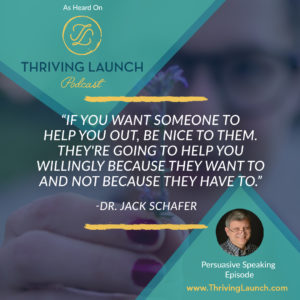

Dr. Jack Schafer
In fact, if you like somebody, you’re going to do whatever you can to help that person out just because you like them.
They’re not going to ask you for anything. They’re just going to do it willingly, and I think that’s the irony that people don’t realize.

Luis Congdon
Kamala asked a question earlier, and it relates now that we’re here at this point Dr. Jack.
In our business and as a couple, one of my jobs that Kamala has given me is anytime we have to call any 1800 numbers, you know who’s going to be making those phone calls.
Getting What You Want And Persuasive Speaking

Luis Congdon
Anytime a live representative gets on the call with me, I imagine that this person is my friend. I imagine that this person wants to help me, and I imagine that they’re hard at work. They’ve been dealing with a lot of nasty people throughout the day. My interest is to make this call a pleasant experience for them.
So I focus less on the problem and focus more on how I can make them laugh or ask them a question most people aren’t going to be asking.
Instead of trying to get it done and over with, I’m more like, “Hey. I’m glad that you’re here to help me and we’re on this call because I’ve been having some problem and I know you get calls like this all the time.”

Kamala Chambers
You saved us thousands of dollars with this calls.

Luis Congdon
Yeah. I have gotten all sorts of discounts, but I think that if I communicate with them that I am their friend or at least think of them as my friend, they’re just one of many people in a huge organization. So, my job is to try to make them smile during that call. That’s all I care about.

Dr. Jack Schafer
You know what you’re doing subconsciously? You’re doing everything that I write about in The Like Switch.
You’re lucky because you can instinctively do it. Many people don’t have that same instinct. So by learning all the techniques that you’re doing, giving that variable a name, then they can intentionally go into those situations and do what you do subconsciously.
That’s what important, is that we can get a lot of people who aren’t naturally ingratiating to become that way.

Luis Congdon
Yeah. That’s very true.
Getting People To Trust You With Non Verbal Persuasive Speaking

Luis Congdon
I’m curious. In your work and doing this task with the FBI, where there times that it was critical turning on this like switch when you were working with someone that maybe committed a crime, or was a suspect?
I’m guessing that this stuff was vital when you’re dealing with an adversarial person.

Dr. Jack Schafer
It’s crucial.
I remember several times I’m talking to murderers. If they confess, they’re going to go to jail for a very extended period perhaps even the rest of their lives. I learned very early on that people will not tell you their secrets unless they like you. If they like you, your chances of getting a confession significantly increase.
My goal at the beginning of the interview is to use those persuasive speaking friend signals and develop a good rapport. Once good rapport has been established, then they’re more likely to confess because they like you. Not because they’re forced to but because they like you.

Luis Congdon
One of the questions we asked earlier, and I appreciate that answer because I think it’s very true in all areas of life.
I think all people from what I’ve seen, if they like somebody, they want to do stuff for you and they want to be connected to you. It’s not only good as a self-motivating, self-interest thing, but it’s also good just because I enjoy having people like me and I enjoy liking other people.
I have an intention of “Let me bring out the best in you and offer the best of me as well.” I find that creates a nice reciprocity circle.
One of the questions that I asked earlier is what about long-term relationships?
4 Ways To Form Friendships And Persuasive Speaking

Luis Congdon
All this stuff right now, calling somebody with some bill, or transaction or some mistake has happened is all very short stuff. Or when I walk in ad want a cold pitch or make a sale, or deal with customer service people and I’m walking in some office, it’s short.
What about some of the longer-term tips that you have to stay in the good graces or have a healthy and maintain a great relationship with someone more long-term?

Dr. Jack Schafer
One of the things you can do to monitor long-term relationships is something we develop called the Friendship Formula.
- All friendships are based on four elements.
People have to be in physical or virtual proximity to develop a relationship. If you don’t know each other exists, there’s a zero chance of a relationship developing.
- You have to be frequently with that person.
If you’re frequently with that person, then they appreciate and like you more.
- Duration
You have to spend time with the person. The more time you spend with somebody, the more you’re able to influence them, and the more they’re able to influence you with persuasive speaking.
- Intensity
Those can be measured in the persuasive speaking nonverbal cues like mutual eye gaze, touching, whispering, food sharing.
All the things we talk about eyebrow flashes.
If you constantly let each other know that there’s intensity in that relationship, then the relationship is going thrive.
Now, in bad relationships, I can easily detect where something went wrong and how to fix it.
The first thing I ask is, “You share the same space?” “Yes.” “Do you frequently share the same space?” “Yes.” “Is there duration to that space or the time you spend together?” “Yes.”
Building Relationships And Persuasive Speaking

Dr. Jack Schafer
Now, we get to the intensity. I ran across this in one of my experiences as a psychologist. The answer was “Yes.” But then, when I got to the intensity portion, the young child said, “Yeah, my dad there’s all the time, but he only talks to me during a commercial when he’s yelling at me to get him a beer.”
And so, what I can do there is say “Aha! We have the three elements but what must we do?”
So I would instruct the father “You’re going to have to spend more time and more intensity. You’re going to have to provide your child with more intensity to let him know that there’s a relationship there.”
If you want to build a relationship, introduce more intensity to the relationship.
You can do that by talking to him more, complimenting more, being with that person more, more emphatic statements.
It’s a way where you can monitor relationships, and it’s a way you can even develop relationships.
A lot of students said at Western Illinois University “I don’t know how to get a girlfriend or a boyfriend.” And I said “The first thing you need is proximity. You have to be where they’re at. The second thing you need is you have to be there frequently.”
Because the more time we spend with somebody, the more we like each other. Even if we don’t talk to one another, we like them more. That’s the psychological principle of familiarity.
Then, you spend duration with them, time with them. And then, there’s intensity. You can develop a relationship using the friendship formula.
The Friendship Formula And Persuasive Speaking

Luis Congdon
That’s cool.
I have a friend who is an incredible networker, and he has a huge contact list on his cell phone and email list. One of things that he does quite frequently and it’s something that I learned from him is he goes through his phone and starts looking at all the people that he hasn’t talked to in a while, and will just message them and say, “Hey, we haven’t spoken in a while. Just curious how you’re doing.”
I used to tease him a little bit about that. I’d say “Man, do you have to reach out to this people to be friends with them? Shouldn’t your friends be people that are always reaching out to you?”
His response was, “Well if you want to have a lot of friends like I do and you want to be connected to a huge amount of people, you consistently need to at least once a week checks in and sees who you haven’t talked to in awhile. Message them and check in with them. That keeps things going.

Dr. Jack Schafer
And he’s using the friendship formula for that to develop those friendships.
I know some salesman have called me or emailed me and said, “You’ve increased my sales.” And I say, “Well, how is that?” They say, “Well, every week now, I stop in to see my client and I don’t ask for a sale. I just say, how you’re doing? How’s the family? What’s going on?” And then, he leaves and then he comes back. Then, when he feels a relationship is strong enough, then he’ll start asking, “Do you need anything?” “I’m selling this.”
Focus On Other People In Persuasive Speaking

Dr. Jack Schafer
He said that even new clients and existing clients order more goods and services from him because he’s developing a relationship with them through frequency, duration, and intensity. So it works in business, in friendships, in law enforcement, and in all areas of life.
One of the key things is that every time somebody meets me and I make them feel good about them, they’re going to want to come back and see me again. I won’t have to invite them back. They’ll do whatever they can or make up whatever excuse they can to come back and see me again because they want that same good feeling again.
If you want a lot of friends, you have to focus on them. Concentrate on other people
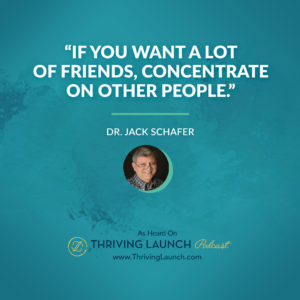

Dr. Jack Schafer
If you focus on other people, they’ll like you. Then, they will be drawn to you instinctively because they want that same good feeling again.

Kamala Chambers
I love everything you’re sharing today.
It’s one of my favorite interviews of all time, honestly.
I’d love to hear, any last thoughts that you have to share with the Thriving Launchers?

Dr. Jack Schafer
I guess the basic thing is if you put the other person first and make the whole relationship about the other person, then they’re going to like you. When they like you, they’re going to develop a good rapport with you. They’re going to help you do things. They’re going to want you to succeed in life because they feel wanted and needed. Isn’t that what life’s about?
It goes back to the rule; do what unto others as you would want them to do onto you. So what we’re doing is putting other people first, and by doing that, we like people. We’re developing relationships, and we’re going to get along a lot better.
Persuasive Speaking Ways To Get People To Flatter Themselves

Dr. Jack Schafer
A lot of times, our ego gets in the way because we think the world revolves around of us. When finally, somebody else puts the other person first, it’s such a refreshing experience for the other person that they’re going to want to experience that again.
Use these simple techniques; the three persuasive speaking friend signals, emphatic statements, and allow people to flatter themselves. That’s the way you could make friends and develop friends.

Kamala Chambers
Thriving Launchers, we’ve been here with Dr. Jack Schafer, an ex-FBI agent, and author.
We’ve been talking about persuasive speaking, influence, attraction, being willing and able to draw people into us.
Thank you so much for tuning in everyone and keep thriving.


